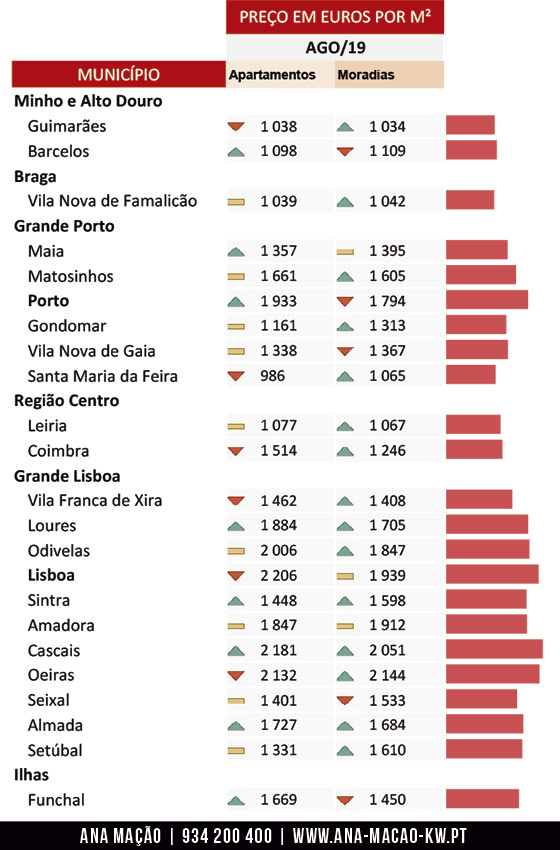There is a common question: "How much is my house worth?" I usually answer : "there is no single price for selling your house, it all comes down to the known relationship between time and price, the higher the sales price, the longer the average time it takes to sell a house ."
To get an answer to this question you will have to first reflect on another question:
How do you intend to sell your home?

The way you intend to sell your home can influence the price you intend to put it up for sale. Therefore, I advise you to consider some preliminary questions, before adjusting the price that best suits the reality of the real estate market:
- Are you going to use a real estate company to help you with the sale, or do you want to sell your home yourself?
- Mediation companies charge, on average, 4 to 5% commission (+ VAT) to the owner, calculated on the price recorded at the time of the deed. This cost can be mitigated or even canceled if the company does a good job and manages to sell the property for a higher price than if it were sold by a private individual. Furthermore, the commission paid to the real estate agency is fully deductible from the capital gains that you have to declare in your IRS, or IRC .
- If you decide to sell alone, you will have to pay all marketing and promotional expenses. If you choose a mediation company, these will be included in the cost of their services;
- The legal and tax obligations associated with the sale of a home involve loss of time, complexity and risks that a professional mediator is better able to resolve.
- Do you want to sell your home quickly or would you prefer to wait to sell for a higher price?
- Everything sells, it's a matter of time and price. If you place the price above the average price, the sale will take longer to complete. If you want to sell the house quickly, then you will have to choose a price below the average value;
- Do you want to maximize the sales price , through improvements or works, or choose to sell direct without additional headaches?
- This is a delicate issue, as the costs of a total renovation are not always easy to recover when selling the house, especially if the amount is large. However, even if there are no substantial gains, it will at least make the sales process faster, as a renovated property is always in greater demand. And in the current state of the used property market, this is a very pertinent question as there are many houses that are offered for sale already renovated or remodeled.
- On the other hand, small interventions such as painting the walls, or even installing a floating floor, could be the key element in making a faster sale or negotiating a higher price;
- Do you want to sell the house with the contents included in the price (furniture, decoration and equipment) or do you intend to deliver it empty?
- Now here is an option that can be good, if the decoration is still current (especially if it was created by a decorator), but as a general rule it can have a negative impact on the number of visits and interested parties. Above all, do not be tempted to add to the price of the property the "emotional" price that the contents have for you, much less to account for the initial cost of acquiring these goods, as furniture and other decorative objects depreciate immensely.
- Are you considering the possibility of selling your house with an exchange ?
- It is a more difficult sale but has substantial gains in terms of tax savings, both for the seller and the buyer, which increases the margin of maneuver to lower the price or negotiate with the other purchasing owner.
How much is your house worth?

As we have already seen, the formula for setting the right price for a house is complex as it depends on multiple factors that influence the price and whose weight is highly subjective. Here are some of these most important variables:
- Location - This is one of the most important variables, as it is associated with the factor that most contributes to the success of the sale: demand. This can vary greatly, even within the same neighborhood or parish. It is not worth comparing prices for properties located in different areas. It is an exercise that only serves to create false expectations in the owner. Proximity to points of interest such as transport, schools or medical services can be an important factor in increasing the sales price;
- Year of Construction - The older the year of construction, the lower the value of your home will be when compared to others located nearby. But there are exceptions: when the state of conservation is very good or has undergone conservation/renovation works, or if it has a past associated with a famous former owner, or relevant historical episodes.The 5-year rule can help you compare the home to other properties for sale in the same area, with similar features. The psychological effect, from the buyer's point of view, tends to fade when the age difference between them is less than 5 years. Therefore, if one property is 11 years old and the other 16 years old, from the buyer's point of view, the age factor will have less impact.
- Typology - Although the property typology is normally linear in terms of calculating the respective price, the areas can have an influence, meaning that a T2 with larger areas can be put up for sale more expensive than a T3 with similar characteristics. Sometimes there is a temptation on the part of some owners to transform a T4 into a T3, or a T2 into a T1, in order to expand the areas, but this remodeling does not always benefit the price of the property and may even devalue it;
- Areas - This is an important variable in price formation and is used in calculating the price per m2 (Price / Area). In the end, if the price per square meter is outside the average values for the surrounding area, there is no point looking for other reasons for not being able to sell, the reason is really the price! But don't be fooled, the price per square meter is a weak indicator for determining the sales price . Normally, indicators available online use advertisement prices (the so-called asking price ) for their calculation and not the price recorded in the sale deed. Furthermore, what area do the advertisements refer to? Useful area? Gross Area? The value of the useful area or dependent area differs and often those who advertise use what is most favorable to them, ignoring what appears in the property register. A balcony does not have the same value as a storage room or garage and these dependent areas have less value than the useful area for housing.
- Property Architecture - This factor is highly subjective and difficult for the owner to consider, especially because their connection to the property is usually emotional in nature. But it is one of the most important factors when analyzed from the demand side. Each client has a different profile and tastes, but a property that has modern lines, especially if it was designed by a proven architecture firm, is half the battle to selling quickly and for a good price. Furthermore, if the house has been recently renovated the price may be even higher;
- Orientation and Sun Exposure - This detail does not go unnoticed by demanding customers. Having or not having good sun exposure, preferably east/west, is a sufficient condition to increase or devalue the price of the house. Furthermore, the brightness of the apartment varies with the architectural design of the house, so each case is different. Idea to remember: if your house has good light then the price may be higher. In this article I talk a little about this issue of sun exposure ;
- Housing Characteristics - It is not possible to estimate the most appropriate value of a house considering only the average market price/m2. Details such as: available finishes and equipment , whether there is a garden or swimming pool , home automation , gas central heating , garage or parking , storage room , laundry , balconies or terraces , elevator , which floor is the apartment, river/sea view , etc. they can increase the value of your home and positively differentiate it from other properties.
How to calculate the market value of your home?

Price is a determining factor in the success of the sale. If you choose a low price you will lose money , if you choose a high price that is out of line with demand/supply it may take longer to sell :
- After 3 weeks/1 month, of "going live" without being sold, the property loses value and the "aura" of newness . After some time has passed without selling the house, the owner does not have many alternatives other than: starting a process of successive write-offs and discounts , which will further amplify this negative effect;
- Furthermore, many buyers resort to bank credit and it is common for negative surprises to appear after the bank evaluation, as if the property is valued at a lower value than the owner requested, the interested customer may have to cancel the deal if they do not have capital. themselves to bridge the gap. Not to mention the disappointment of the potential buyer who loses the value of the bank appraisal and the owner who wasted time in this entire process.
There are several ways to determine the price you want to put your home for sale. To calculate the market value of your property you have several options:
1 – Ask a professional for help. It is the most common way and can save you time and money.
- You can use a valuation expert , but this obviously has costs. However, the rigor of a Property Appraiser is well worth the price, especially if the property has unique characteristics, or if, for example, several owners and interested parties are involved (example of a property whose ownership belongs to several heirs). PAI uses confidential information such as the prices of recently registered properties in the area, which sometimes differ from the advertised prices when these properties were for sale.
- You can ask for help from a real estate consultant . If you are an experienced professional, you will not only be able to use your databases to compare and define a price closer to the market (when the mediator is large, we are talking about DBs with tens or even hundreds of thousands of real estate), as well as using your own sensitivity and knowledge of the market to help you bring the price of your home closer to the price right .
2 - Carry out this task alone , using various indicators and tools, such as:
- Consult data from INE or Finance . If you live in the cities of Amadora, Braga, Coimbra, Funchal, Lisbon, Porto or Vila Nova de Gaia you can consult the average prices/m2 for houses and apartments on this INE website , and the details can go down to the level of the parish, neighborhood or block. The Finance Portal has a similar service.
- Use the tools of some websites that collect the same type of information, allowing you to consult average values by municipality/parish. There is, for example, the Deco website .
- Use the average bank valuation values for housing (€/m²) that INE publishes monthly , distributed among municipalities with a population of more than 100,000 inhabitants (2011 census data). Below you can see my table with just some of the cities, based on these values:

- Consult the websites of real estate agents comparing your property with others that are for sale in the same area, with similar characteristics. For example, there is the Keller Williams Portugal website, where you also have the possibility of requesting a free consultation assisted by a consultant, which is carried out using its own databases. This consultation has no costs or other obligations and I will always be at your disposal to help you if you wish, just contact me .
- Using online Assessment Simulators , such as Casa Sapo .
- Use the advertising websites Casa Sapo , Idealista , Imovirtual , BPI Expresso Imobiliário , etc. and consult the prices of the different properties advertised. The possibility of filtering the search by area, typology and other characteristics facilitates comparison and allows for finer adjustment. Furthermore, there you can find the average price values per square meter calculated based on property advertisements, for the areas you want to search.
- Check with the neighborhood to see if any property has been sold recently and at what price. Please note that the values that matter most are those referring to transactions carried out and not to announced prices ( asking price ). Between the price announced by an owner and the actual carrying value there is almost always a big difference, which can even be quite large;
Psychological price, details also count!

Can psychology help you choose the right price? Considering that price is a crucial factor in selling a home, it is natural to think that all the advantages you can use to your advantage will be useful for the purpose in mind, which is selling your home! Adjusting the final value of the sales price depending on the respective numerical value, based on subjective perception factors, may influence:
1. The 99.99 syndrome
We all know the classic trick of marking the price with a 999 or 990 at the end. It is believed that this theory emerged in the 1880s, aiming to convince the naive that they were buying a "bargain". But is it worth it? Using 99 or 95 in the price of your house will not fool smart people and these are usually the ones who buy houses (although not always ;) ! On the other hand, it can make online research difficult, as if a buyer has a defined investment limit, they will filter their search for houses, for example, between €200,000 and €225,000. Now, if you set the price at €199,900, this buyer may not see your property advertisement. Therefore, a price of around €200,000 will be more effective as it will appear on both sides of the search; for those looking for between €175,000 and €200,000 or for those looking for between €200,000 and €225,000. On the other hand, if you want to position your home in the luxury customer segment, you cannot convey the idea that it is a discount price. Ferrari and many other luxury brands also use this method to brand their products.
2. The power of four and seven
One of the price marking methods, used by large supermarket chains such as Wal-Mart and Home Depot, involves taking advantage of the psychology of price by using the " power of four and seven ". For example, a price of €247,000 or €244,000 induces the customer to believe that the price was determined accurately and was chosen taking costs into account. In this way, the buyer is given the idea that there is less room to negotiate and this assumption benefits the seller. On the other hand, this method focuses on marking unique prices that stand out compared to the rest . When your house appears among many others, for example in a listing on an advertising portal and where the remaining prices have many zeros, the price of your house will stand out as being different and more exclusive, thus attracting attention. buyer's attention .Some believe that using four and seven in pricing creates bonds of empathy in potential buyers, firstly because they are friendly numbers and secondly because seven is a lucky number.
3. How to write the price
If you are someone who uses printed marketing material (flyers, signs, newspaper ads, etc.) you can modify the way the price is written (on online portals this is usually not possible) which can affect the way people perceive the price. The Journal of Consumer Psychology found that when people have to spell out the price in their head, it can seem higher. E.g. see these three prices:
- €1,400.00
- €1,400
- €1400
In this study, the last price, without a comma, seemed lower in the eyes of consumers. So the next time you have to write a price on your flyers, or in the newspaper, opt for €177,000 instead of €177,000. On the other hand, Cornell University carried out another study on the same topic and came to the following conclusions:
- 5.00 (best seller)
- €5.00 (least sold)
- five euros (best seller)
There are restaurants that show prices this way on the menu. How can the same be applied to real estate marketing? Instead of €100,000, write one hundred thousand euros or 100 thousand.
4. Applause for the zeros
Whenever the property suffers a price drop and it can be advertised in a personalized way (e.g. on social media), try adding more zeros to the discount value to create the idea of a greater drop. For example, write "price drop of €50,000.00" instead of "€50,000".
Source: Inman
Capital gains, taxes and other expenses...
So it is! It is not enough to determine a sales price, promote and sell your home... the final recorded value will not revert in full to you , you must take into account the legally stipulated taxes and expenses. That's why when calculating the price at which you want to sell your home you must take these costs into account, if you don't want to be surprised later !
Firstly, you will have to consider the issue of capital gains, because you may have to pay tax on part of the income obtained from the sale of your home .If you need to calculate the value of tax on capital gains, you can use this DECO simulator .
But you may not have to pay anything! If the house sold is considered as the taxpayer's or his family's own and permanent home, then there is no need to pay tax, as long as the income received is reinvested in the purchase of another house , also for own and permanent housing. To benefit from this exemption you have 3 years to do so . If the house you buy has a higher value than the one you sold , there is no need to pay this tax. If the value is lower , the tax to be paid will be calculated based on the difference between the value of the house you sold and the value of the house you purchase. The settlement will be made at the IRS level , with the taxable amount included in your income for the respective tax year. Only 50% of the taxable value will count towards the calculation of capital gains, which is determined according to the following formula:
Capital gain = Sale value of the Property - Acquisition value of that Property * Monetary coefficient - Charges - Expenses
There are deductions for some expenses related to the sales process and other expenses that you have invested in the house, proven to have been incurred in the last 12 years, such as:
- Expenses for works, improvements or replacement of windows;
- The commissions you paid to the Real Estate Agency that mediated the sale of your home, if this is the case;
- Costs for obtaining the Energy Certificate, which is mandatory to be able to sell your home;
- The IMT tax Municipal Tax on Onerous Transfer of Properties for the purchase of the house sold;
- Expenses for registration and the deed for the sale of the house.
Situations in which there is room for exemption from paying tax on capital gains are:
- If the house sold was acquired before January 1, 1989, it is exempt from paying tax ;
- If the house sold was purchased using a mortgage loan and there is no other house at the date of the sale deed, the amount used to settle the loan will not be subject to capital gains (valid only between 2015 and 2020);
Conclusions
With the national market in full swing and the media spotlight focusing on real estate activity, choosing the right price is a difficult task to carry out with consideration, sensibility and competence. But it is necessary to take into account that in 2019 the market is already correcting the prices of used homes downwards , especially those that are not located in premium or high-demand areas.
If expectations have risen on the owners' side, influenced by the media "buzz", on the side of real estate mediation professionals, unfortunately, the lack of suitability of some exacerbates these expectations even further. Aggressive commercial attitudes such as: " suggesting a high sales price just to get the deal , thus meeting the owner's dream of selling his used house, as if it were new", are perverse and contribute to inducing a climate of false expectations and a speculative environment that harms everyone, mediators, buyers and owners.
The price at which a property is put up for sale is crucial to the success of the operation . Don't go into crazy pricing that will only disappoint you and waste time. Consult a proven professional and you will see that you won’t regret it!



